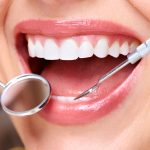The Oral Cancer Exam
Do you want to hold onto your natural teeth for as long as possible? Do you smoke or have a history of smoking? Does anyone in your family have a history of cancer? Do you want to maintain a healthy body? Cancer is more prevalent in today’s society than ever before. Our diet, the pollution in our air, smoking, and several other factors are contributing to the rise of cancer. Among those victimized by cancer, a large percentage are diagnosed with oral cancer. It has become important now more than ever before to visit your Fairview dentist for somewhat regular oral screenings. Let’s take a look at what oral cancer screenings are, how they are done, who performs them, and what the benefits of regular screenings are.
What are oral cancer exams?
Also known as oral cancer screenings, oral cancer exams search for cancer even before a person develops symptoms. Early detection of abnormal tissue or cancer is essential to treating it effectively. Cancer has already begun to spread once symptoms begin to appear. Scientists are currently attempting to discover who is at greater risk to oral cancer because they are interested in figuring out who they should recommend for oral cancer screenings and how often tests should be carried out. It’s important to note that if your doctor recommends that you get a screening, it doesn’t mean that you DO have cancer. Instead, they are insinuating that it may be a good idea because it poses a potential risk to you. A screening test that comes back abnormal will require further diagnostic testing to determine if cancer is the culprit or not.
Who performs an oral cancer exam?
Your dental professional is the best person to see for an oral cancer exam. They are trained in the field of oral hygiene and will be able to notice any abnormalities or potentially harmful tissue in your mouth.
What does an oral cancer exam consist of?
Despite the lack of set routine or procedure, your medical professional should do something similar to the following:
1. Preparation: Full or partial dentures will need to be removed prior to the exam.
2. Inspection: Your professional should inspect your face, neck, lips, and mouth for any signs of cancer or abnormal tissue.
3. Physical: Your medical professional should use both hands to feel underneath your jaw and the side of your neck for any signs of cancer including lumps.
4. Look and feel: Your medical professional should look and feel the inside of your lips and cheeks in search of any early signs of cancer.
5. Tongue: Your medical professional should check your tongue for any abnormal swelling, colour, or texture. The top, base, and underside of your tongue should all be inspected.
What are the benefits of oral cancer exams?
Here are a few benefits of somewhat regular oral cancer screenings:
• Increase your chance of preventing oral cancer
• Keep your mouth and rest of your body healthy by preventing the spread of cancer from your mouth to the rest of your body
• Early detection means better treatment





